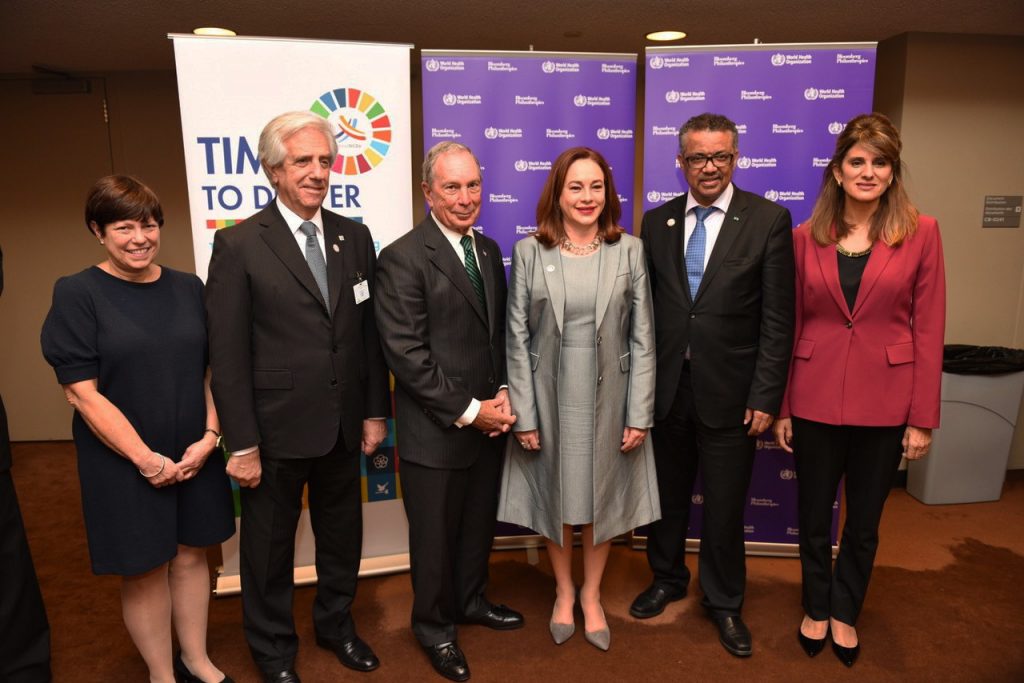It’s Time to Act: Addressing the Noncommunicable Disease Epidemic

By Dr. Kelly Henning, Bloomberg Philanthropies’ Public Health program lead
For the first time in history, more people are dying of noncommunicable diseases (we call them NCDs) such as heart disease, cancer, diabetes, and chronic respiratory disease than infectious diseases. These diseases, which are responsible for 41 million deaths every year, including 17 million people who die prematurely before the age of 70, are responsible for cutting promising lives short around the world. On top of that, 5 million people die every year from injuries, and road traffic crashes are the leading cause of death among young people aged 15–29 years.
To make matters worse, these diseases cost countries billions of dollars in health care costs and lost productivity, and contribute to the never-ending cycle of poverty by harming people’s ability to work and feed their families.
But here’s the good news: Many of these premature deaths and disabilities could largely be prevented by implementing proven, cost-effective measures.
At Bloomberg Philanthropies, our mission has always been to help the greatest number of people live longer, better lives. That’s why we’re so pleased that today, World Health Organization Director-General Dr. Tedros Adhanom Ghebreyesus announced the reappointment of Michael R. Bloomberg as the WHO Global Ambassador for NCDs — a position he’s held for the last two years. As ambassador, he’ll continue to raise awareness of the burden of NCDs and to promote globally the policy solutions that make a real difference in saving lives.
Also today, Michael Bloomberg addressed the UN High-Level Meeting on NCDs where he urged governments to enact the evidence-based, smart policies that can help save millions of lives despite strong industry opposition—for example, policies to ban tobacco advertisements or tax sugary beverages. Many of these require relatively little budget to enact but do require strong political will to overcome industry interference.
Since founding Bloomberg Philanthropies, Mike Bloomberg has spearheaded national and local action to highlight the burden of NCDs and injuries. Here are only a few examples:
- Since 2007, our public health program has spent almost $1 billion helping to spread a set of policies—known as MPOWER—that are proven to drive down rates of tobacco use. When we started, only 42 countries had one of those policies in place. Today more than 120 countries worldwide do—and we have been proud to partner with more than half of these.
- Last year, we launched the Partnership for Healthy Cities, a prestigious global network of cities working to implement evidence-based policies that create healthier, safer communities. In just 18 months, over 50 cities have joined the Partnership and implemented policies from smoking bans to enforcement of seat belt use to requiring more nutritional food in school lunches.
- Most recently, at the 17th World Conference on Tobacco or Health in March 2018, we announced the global tobacco industry watchdog STOP—Stopping Tobacco Organizations and Products—which will aggressively monitor deceptive practices to undermine public health.
- And we’re supporting a task force that is studying how fiscal policies—such as excise taxes—can help to reduce the harmful effects of tobacco, sugary drinks and alcohol.
With deaths from NCDs and injuries overtaking infectious diseases, the urgency to act is obvious. We need to rally partners around the world to effect change. With this many families and lives at stake and proven ways to save them, we can’t wait another minute.